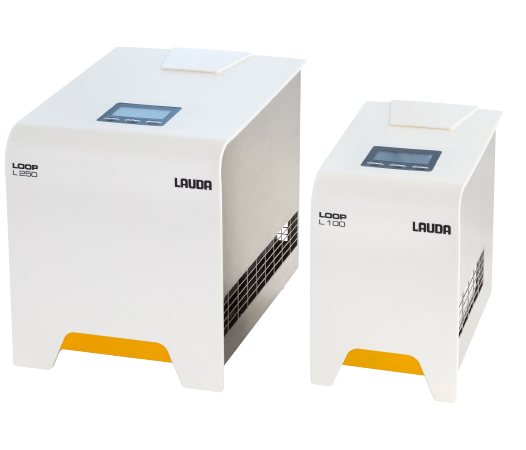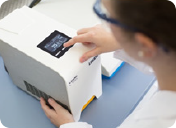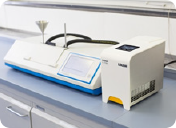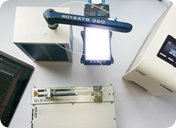WELCOME TO THE WORLD OF LAUDA LOOP.
The LAUDA LOOP product line includes two thermoelectric (Peltier) circulation thermostats for external temperature control thermostating. With cooling capacities of 120 and 250W and a temperature range of 4 to 80°C the focus is on applications with constant temperatures and low power consumption. In this partial load range specifically the LOOP operates with high energy efficiency. It provides heating or cooling only when required by the application. No refrigerant is needed which makes it environmentally friendly.
LAUDA LOOP circulation thermostats operate within the 4 to 80°C range using the latest Peltier technology. The two air-cooled devices, L 100 and L 250, have a cooling capacity of 120 and 250 Watts.
Cell changer in a UV/Vis device between 10 and 80°C
Measurement of UV/Vis spectra is part of qualitative and quantitative analysis. Its purposes include investigating structures and detecting molecules in liquid samples. Temperature control thermostating is important to produce precise results.
Temperature control thermostating of small samples in the laboratory
To prepare the samples they are brought to the correct temperature in advance. Typical temperatures in laboratories are 4°C and 37°C.
Temperature control thermostating of the tubes in a polarimeter at 20 and 25°C
Certain solutions interacting with linearly polarized light produce an angle of rotation. The angle is characteristic for a specific substance. Practical applications include determining the sugar content of an aqueous solution. The measurement is usually carried out at standard temperatures of 20 or 25°C.
Heat discharge for an LED light source (LED array)
It is important to ensure the LED light source does not overheat. The temperature must not rise above 50°C. The LOOP is used to discharge the heat generated.
The small size and weight make them perfect for a wide variety of laboratory applications. They have a menu driven interface using three keys and a bright, high-contrast OLED display.
Temperature control thermostating of small samples in the laboratory
To prepare the samples they are brought to the correct temperature in advance. Typical temperatures in laboratories are 4°C and 37°C.
Refractometer at 25°C
The refractive index of a solution is characteristic for the specific substance and is often used in qualitative analysis. The refractive index depends on the temperature and is measured with a refractometer.

The LAUDA LOOP is at home anywhere. Our compact circulation thermostat is perfect for applications in which a constant temperature is critical. Its working temperature range is between 4 and 80 °C.
And for you? It makes your work significantly easier. Do you lack space? Do you need the LAUDA LOOP at short notice for a short-term second or third application? Do you want to take it with you to another laboratory or to another building? It’s all possible. The LAUDA LOOP adapts with you, wherever you want to use it.
This is made possible by its compact size and lightweight construction, weighing just eight or twelve kilograms, depending on the version. You can even travel with the LAUDA LOOP: Its wide voltage input range of 100 to 240 Volts means that it can be used worldwide.
It’s easy to get started thanks to plug and play using quick-fit couplings. And there is no weighty instruction manual needed to get familiar with the controls. The LAUDA LOOP makes it easy. The menu is available in five languages and is navigated via a convenient 3-button softkey control pad. The OLED screen provides a bright, high-contrast display.
The location - wherever you need it.

Process refractometer at 25°c

Cell changer in a uv/vis device between 10 and 80°c

Temperature control thermostating of the tubes in a polarimeter at 20 and 25°c
The LAUDA LOOP’s unique feature:
it works efficiently everywhere – in both versions, of course. It cools and heats within a working temperature range of 4 to 80°C. It performs particularly well in applications having requiring a constant temperature. The two air-cooled device types are highly versatile, whether it’s for use in life sciences, analysis or chemical laboratories.
For the LAUDA LOOP, we opted for the benefits of Peltier technology. This technology enables accurate and rapid heating or cooling as required. All this with a low weight, small size and entirely without refrigerant, which is a clear benefit for the environment.
Maximum energy-efficiency is achieved under partial load. Compared with the smallest compressor-powered thermostats, the LAUDA LOOP consumes up to 50 percent less energy. A nice side-effect is that it’s easy on the wallet too, as the economical LAUDA LOOP runs with low operating costs.
Your Benefits
- No refrigerant
- Working temperature range from 4 to 80°C
- Low operating costs
The LAUDA LOOP can be used throughout the added value chain. This means is that it is a reliable partner - from goods-inwards inspection, via quality assurance and research through to sample preparation. You decide where the LAUDA LOOP is used. No matter where you need it: we always place great value on maximum safety.
We have installed an RS 232-interface as standard. Communication is more than just a word for the LAUDA LOOP. For a safe operation, the LAUDA LOOP also provides functions such as an integrated button lock, an auto-start feature and a warning signal when exceeding temperature limits. Otherwise, the LAUDA LOOP is so quiet and vibrates so little that it is barely noticeable.
Your Benefits
- Small size, low weight
- Refrigerant-free temperature control thermostating with Peltier technology
- Power-regulated ventilator fan
- Exceptionally energy-efficient in partial-load operation
- 3-button controls with OLED display
- Heating and cooling with the same components
- Voltage: 100 – 240 V, 50/60 Hz
- RS 232-interface as standard
LAUDA Technology Limited
1200 Century Way
Thorpe Park Business Park
Colton, Leeds LS15 8ZA
Tel.: +44 113 251 5010
E-mail: info@lauda-technology.co.uk
Temperature control thermostating of the tubes in a polarimeter at 20 and 25°C
Certain solutions interacting with linearly polarized light produce an angle of rotation. The angle is characteristic for a specific substance. Practical applications include determining the sugar content of an aqueous solution. The measurement is usually carried out at standard temperatures of 20 or 25°C.




